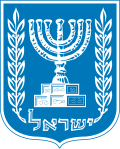| | |||||||||||||||||||||||||||||||||||||||||||||||||||||||||||||||||||||||||||||||||||||||||||||||||||||||||||||
| |||||||||||||||||||||||||||||||||||||||||||||||||||||||||||||||||||||||||||||||||||||||||||||||||||||||||||||
173 seats in the Assembly of Representatives | |||||||||||||||||||||||||||||||||||||||||||||||||||||||||||||||||||||||||||||||||||||||||||||||||||||||||||||
This lists parties that won seats. See the complete results below.
| |||||||||||||||||||||||||||||||||||||||||||||||||||||||||||||||||||||||||||||||||||||||||||||||||||||||||||||
| Part of a series on the |
 |
|---|
Elections to the Assembly of Representatives of Mandatory Palestine were held on 2 August 1944. [1] Just over 200,000 Jewish residents voted, more than 70% of all those eligible to vote. This compared with just over 50,000 who voted at the previous elections in 1931. The difference reflected the high level of Jewish immigration to Palestine in the 1930s and 1940s.
